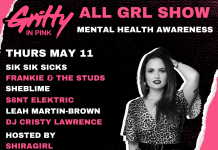By Leslie Buttonow
 Gender discrimination in the music industry is a topic frequently reported on at the WiMN. Very often, our Front and Center series offers advice from women in various corners of the industry on how they’ve personally handled discrimination. Today’s Front and Center interview features someone who is tackling the issue head-on, and very publicly.
Gender discrimination in the music industry is a topic frequently reported on at the WiMN. Very often, our Front and Center series offers advice from women in various corners of the industry on how they’ve personally handled discrimination. Today’s Front and Center interview features someone who is tackling the issue head-on, and very publicly.
Dr. Kristin J. Lieb has experienced and researched several corners of the industry, both as a former indie record label exec, and as a popular culture and music writer for publications such as Rolling Stone and Billboard. Her observations, along with her Ph.D. studies, led her to author a book she hopes will disrupt the age-old challenges female musicians face in the way they are branded and packaged based on their gender. Gender, Branding, and the Modern Music Industry was written for music fans, academics and business marketers – especially those in the entertainment industry. She has also since gone on to give a TEDx talk about this subject, held at Tufts University.
As a professor at Emerson College’s Department of Marketing Communication, Lieb has used her book in her curriculum – as have many other educators – to bring awareness to this important issue so that future generations don’t fall into or continue along the same destructive path.
We recently caught up with Lieb to learn more about what led her to where she is now, to hear some of her insights about being a female in the music industry, and what it takes to grow, achieve your goals, and be the change you want to see in the industry.
Learn more at kristinjlieb.com.
The WiMN: Let’s start by giving our readers some context about your background. Would you share a bit about some of your previous work in the music industry?
KJL: I started as a freelance writer for Billboard, Rolling Stone and a handful of other publications. While I was doing that, I was also getting an MBA. When I graduated, I went to work for Newbury Comics, an independent music and pop culture retailer in New England. I started as Director of Marketing for Newbury Comics Interactive — a division of Newbury Comics that handled its mail order and web site operations — and I went on to become Executive Director.
While I was there, I got a call from Al Teller, who had run United Artists Records, Columbia Records, CBS Records, and the MCA Music Group. He wanted to start a vertically integrated record label in LA and asked me to join him. The opportunity sounded exciting, so I moved to LA and went to work for what would soon become Atomic Pop. Our roster included Ice T and Public Enemy, among others, and I had a blast running our ecommerce and marketing efforts and later doing strategic partnerships for our artists. I also worked for two other music-related start-ups — and Harvard Business School — before starting my Ph.D.
The WiMN: How did you come to write for those prominent publications, and what were some of the topics you covered?
KJL: With Billboard, my first three stories ran on the cover, which was such a thrill at the time that I still remember it vividly. They were about the history of Ska, the birth of the Internet Underground Music Archive, and the rise of Boston act Letters to Cleo. I also wrote a number of pieces about how technology was changing music production, distribution, and marketing.
For Rolling Stone, I remember writing about Boston solo artist Tracy Bonham, and the Fort Apache recording studio. Then I took a long, long break from non-academic writing (much of it was about popular music) while I focused on getting tenure. But I recently returned to more mainstream writing with a piece about queer representation in popular music for BuzzFeed. It made me remember how much I enjoy writing for wider audiences. I am definitely interested in writing more for popular and trade publications in the future – especially about representations of gender, sexuality and race in popular music.
The WiMN: What was your “aha moment” when you developed a strong drive to dig in, explore and expose the gender packaging and pitfalls faced by female musicians?
KJL: During my Ph.D. program, I saw a documentary called Killing Us Softly, which is a recorded lecture by the legendary Jean Kilbourne. She offered a critical analysis of the advertising industry over several decades and found disturbing patterns that locked women into all kind of prohibitive positions. The images she presented depicted rampant objectification and dismemberment, sexualized children and infantilized women; and bodies constructed as disgusting if they weren’t viewed as perfect, white, cis, and heteronormative beautiful. This shook me — enough to change my research trajectory immediately. I began thinking about how I could take what I knew, and what she had observed, and turn it into something that would help explain the way women are presented and framed in popular music.
What I learned through my own research with people involved with the pop star production process in various ways, is that for women pop stars, their main marketing asset is their bodies and how they can be leveraged for success in all manner of entertainment realms. I also learned that there are recurring patterns—“the good girl,” the “temptress,” the “diva,” the “exotic,” the “provocateur,” the “whore,” the “hot mess,” the “survivor,” the “qay icon” — which I would probably re-title to the “queer icon” in 2019 — and a few others. These names of these categories are horrible, because they’re so dismissive and reductive, but they are presented in the language of the industry to make that exact point. It’s not OK to talk about talented humans this way — especially if you’re in charge of part of their career management!
It is very difficult to succeed at the top levels of the industry if you can’t fit into these limited and limiting categories, which in many ways discourages more nuanced modes of expression. Indie stars play by different rules — they get to focus on their music first, and not worry as much about these appearance and framing demands.
The WiMN: Your book Gender, Branding, and the Modern Music Industry has been widely acclaimed by educators using it in their curriculum. What is your hope for the future as more and more people read it?
KJL: I tried to tell a complicated gender story through as many lenses as possible to show how difficult it is to see gender problems clearly, and fix them–especially in male-dominated entertainment industries driven by capitalistic imperatives. I wrote it to be a teaching book for professors offering courses in communication, sociology, gender and sexuality studies, and music industry studies, and it has resonated in all of these areas, which is encouraging and terrific. I just released a second edition in 2018.
My hope is that I have made my case clearly enough so these awful patterns stick with students, and motivate them to interrupt or challenge them when they see them, and fix them when they make their own media.
I also hope that more people in the industry read the book because that’s where the change really needs to happen. Over the years, I have received emails from artists, artist managers, journalists, documentarians, and music industry professors who have told me they have found my book useful in practice–in various ways–and that is incredibly rewarding.
Ultimately, I hope there won’t need to be a third edition for this book because I’d rather write a new book about how much has changed.
The WiMN: Any memorable anecdotes from your students on this subject?
KJL: I would love to spend an hour answering this question, and I legitimately could, but because we’re short on time, I’ll stick to two from the last two months. When I asked students in one class why they had decided to take this elective, one said, “To learn how to cancel R. Kelly.” Another student, who is also a musician, came to see me in office hours to make sure his lyrics “didn’t sound predatory” or “accidentally reproduce any of the gender and sexuality problems we have been talking about.” There have also been dozens of moments where students recognize a pattern in a song, video, or performance and email it to me—or when they find something more encouraging, and want to share that, too. It all makes me feel very lucky to be able to do what I do.
The WiMN: During your time in the music business and writing for music publications, have you personally ever experienced discrimination as a female? If so, how did you handle it?
KJL: Yes. Generally, I just fired back – often with a joke to try to communicate a boundary without facing retaliation. That was just my style and I know a lot of people don’t feel comfortable or safe doing that for a variety of reasons. And they shouldn’t have to.
Now, I write and teach about such gender-based discrimination so we all see it for what it is — gender-based discrimination — and so we build vocabularies for discussing it and strategies for combating it — for ourselves and for others.
The WiMN: What is your best advice to young women looking to start a career and succeed in any aspect of the music business?
KJL: To learn how it works from other women — especially women from other generations — first. And to really listen to the way it works, and not to assume it will be different for them, though I sincerely hope it will. To enter the business with their eyes open, and ready to make the changes that need to be made. To think of themselves as great allies to other women; not as competitors. To figure out how to produce what people need — and what’s missing — from their cultural lives. And finally, to know they don’t need to be the last one standing at the bar at night to succeed. It’s often better to be the first one in the next morning, for many reasons.






